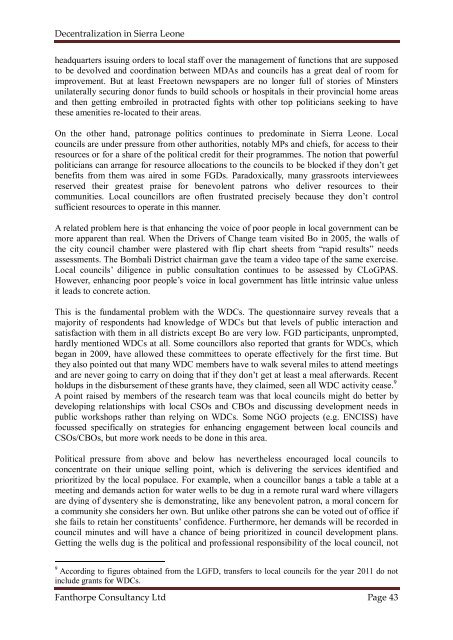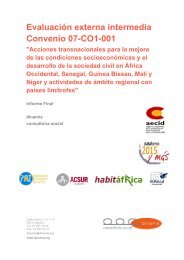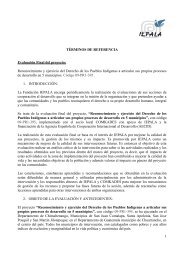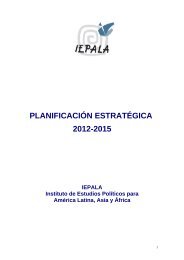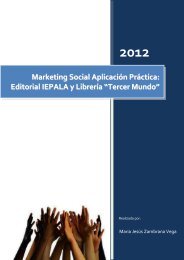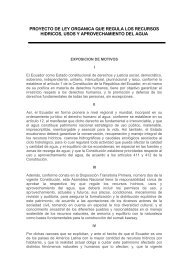Decentralization in Sierra Leone - Research for Development
Decentralization in Sierra Leone - Research for Development
Decentralization in Sierra Leone - Research for Development
Create successful ePaper yourself
Turn your PDF publications into a flip-book with our unique Google optimized e-Paper software.
<strong>Decentralization</strong> <strong>in</strong> <strong>Sierra</strong> <strong>Leone</strong>headquarters issu<strong>in</strong>g orders to local staff over the management of functions that are supposedto be devolved and coord<strong>in</strong>ation between MDAs and councils has a great deal of room <strong>for</strong>improvement. But at least Freetown newspapers are no longer full of stories of M<strong>in</strong>stersunilaterally secur<strong>in</strong>g donor funds to build schools or hospitals <strong>in</strong> their prov<strong>in</strong>cial home areasand then gett<strong>in</strong>g embroiled <strong>in</strong> protracted fights with other top politicians seek<strong>in</strong>g to havethese amenities re-located to their areas.On the other hand, patronage politics cont<strong>in</strong>ues to predom<strong>in</strong>ate <strong>in</strong> <strong>Sierra</strong> <strong>Leone</strong>. Localcouncils are under pressure from other authorities, notably MPs and chiefs, <strong>for</strong> access to theirresources or <strong>for</strong> a share of the political credit <strong>for</strong> their programmes. The notion that powerfulpoliticians can arrange <strong>for</strong> resource allocations to the councils to be blocked if they don’t getbenefits from them was aired <strong>in</strong> some FGDs. Paradoxically, many grassroots <strong>in</strong>tervieweesreserved their greatest praise <strong>for</strong> benevolent patrons who deliver resources to theircommunities. Local councillors are often frustrated precisely because they don’t controlsufficient resources to operate <strong>in</strong> this manner.A related problem here is that enhanc<strong>in</strong>g the voice of poor people <strong>in</strong> local government can bemore apparent than real. When the Drivers of Change team visited Bo <strong>in</strong> 2005, the walls ofthe city council chamber were plastered with flip chart sheets from “rapid results” needsassessments. The Bombali District chairman gave the team a video tape of the same exercise.Local councils’ diligence <strong>in</strong> public consultation cont<strong>in</strong>ues to be assessed by CLoGPAS.However, enhanc<strong>in</strong>g poor people’s voice <strong>in</strong> local government has little <strong>in</strong>tr<strong>in</strong>sic value unlessit leads to concrete action.This is the fundamental problem with the WDCs. The questionnaire survey reveals that amajority of respondents had knowledge of WDCs but that levels of public <strong>in</strong>teraction andsatisfaction with them <strong>in</strong> all districts except Bo are very low. FGD participants, unprompted,hardly mentioned WDCs at all. Some councillors also reported that grants <strong>for</strong> WDCs, whichbegan <strong>in</strong> 2009, have allowed these committees to operate effectively <strong>for</strong> the first time. Butthey also po<strong>in</strong>ted out that many WDC members have to walk several miles to attend meet<strong>in</strong>gsand are never go<strong>in</strong>g to carry on do<strong>in</strong>g that if they don’t get at least a meal afterwards. Recentholdups <strong>in</strong> the disbursement of these grants have, they claimed, seen all WDC activity cease. 9A po<strong>in</strong>t raised by members of the research team was that local councils might do better bydevelop<strong>in</strong>g relationships with local CSOs and CBOs and discuss<strong>in</strong>g development needs <strong>in</strong>public workshops rather than rely<strong>in</strong>g on WDCs. Some NGO projects (e.g. ENCISS) havefocussed specifically on strategies <strong>for</strong> enhanc<strong>in</strong>g engagement between local councils andCSOs/CBOs, but more work needs to be done <strong>in</strong> this area.Political pressure from above and below has nevertheless encouraged local councils toconcentrate on their unique sell<strong>in</strong>g po<strong>in</strong>t, which is deliver<strong>in</strong>g the services identified andprioritized by the local populace. For example, when a councillor bangs a table a table at ameet<strong>in</strong>g and demands action <strong>for</strong> water wells to be dug <strong>in</strong> a remote rural ward where villagersare dy<strong>in</strong>g of dysentery she is demonstrat<strong>in</strong>g, like any benevolent patron, a moral concern <strong>for</strong>a community she considers her own. But unlike other patrons she can be voted out of office ifshe fails to reta<strong>in</strong> her constituents’ confidence. Furthermore, her demands will be recorded <strong>in</strong>council m<strong>in</strong>utes and will have a chance of be<strong>in</strong>g prioritized <strong>in</strong> council development plans.Gett<strong>in</strong>g the wells dug is the political and professional responsibility of the local council, not9 Accord<strong>in</strong>g to figures obta<strong>in</strong>ed from the LGFD, transfers to local councils <strong>for</strong> the year 2011 do not<strong>in</strong>clude grants <strong>for</strong> WDCs.Fanthorpe Consultancy Ltd Page 43


